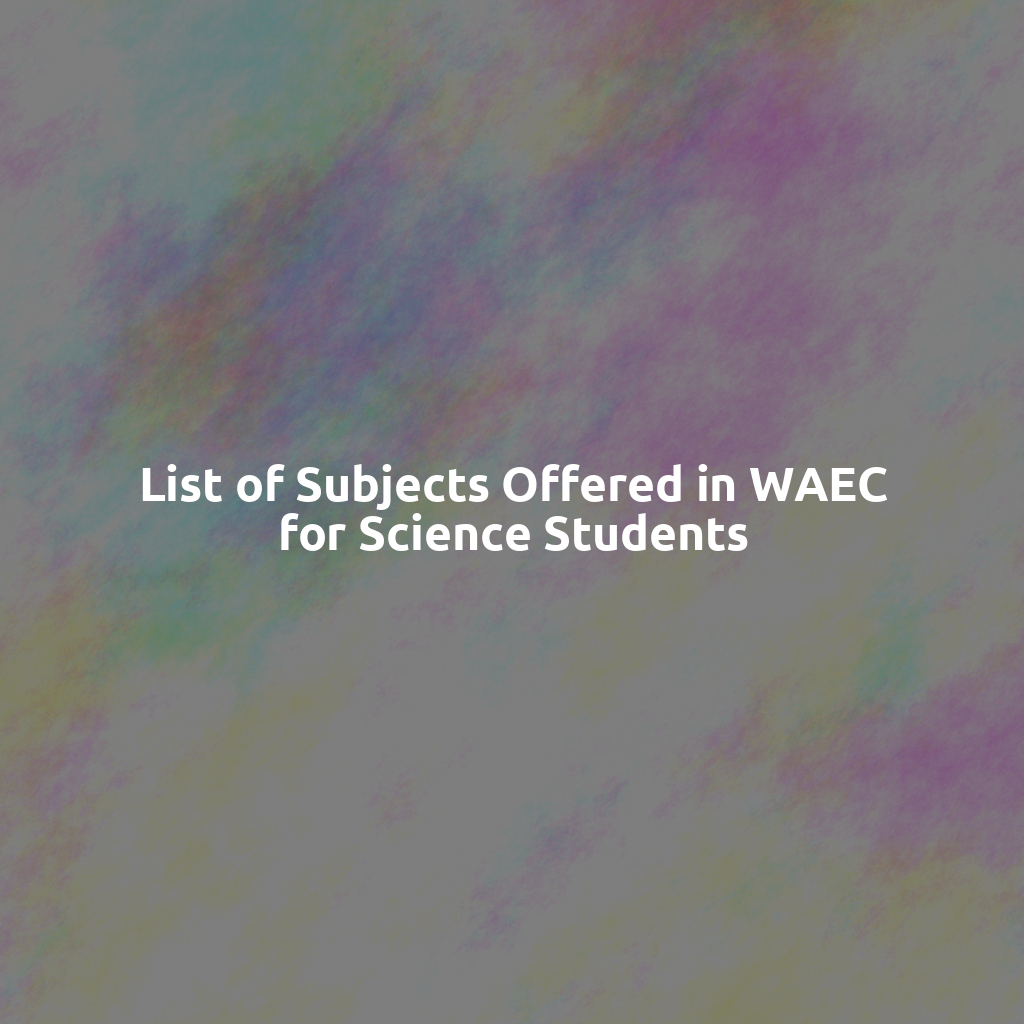Overview of WAEC and its Significance for Science Students
The West African Examinations Council (WAEC) plays a crucial role in education.
It conducts examinations for students in five West African countries.
WAEC provides standardized assessments for secondary education.
Specifically, it influences the academic and professional paths of students.
Importance of WAEC for Science Students
WAEC qualifications are essential for further education and career opportunities.
Advertisements
Science students can showcase their knowledge in various subjects.
Additionally, WAEC results are often prerequisites for university admission.
Furthermore, the curriculum emphasizes critical thinking and problem-solving skills.
This focus equips students for the challenges in scientific fields.
Subjects Offered in WAEC for Science Students
WAEC offers a wide range of subjects tailored for science students.
These subjects prepare students for higher learning and professional careers.
- Biology
- Chemistry
- Physics
- Mathematics
- Further Mathematics
- Information Technology
- Agricultural Science
- Health Science
Each subject focuses on developing specific skills and knowledge.
Moreover, students can customize their learning paths based on interests.
The Role of WAEC in Scientific Education
WAEC serves as a foundational step in science education.
It enhances the academic qualifications of students across West Africa.
Ultimately, WAEC prepares students for the dynamic nature of science and technology.
Advertisements
Core Science Subjects Offered in WAEC
Biology
Biology explores the study of living organisms in detail.
It covers various topics, including genetics, ecology, and evolution.
This subject is essential for understanding life processes.
Students learn about the structure and function of cells.
Furthermore, they examine the interaction between different species.
Chemistry
Chemistry deals with the composition and properties of substances.
It provides insights into chemical reactions and their applications.
Students study organic and inorganic chemistry topics.
This subject is crucial for careers in healthcare and engineering.
Moreover, it enhances problem-solving and analytical skills.
Physics
Physics focuses on the fundamental principles of the universe.
It includes the study of forces, energy, and motion.
Students learn about concepts such as gravity and electromagnetism.
This subject encourages critical thinking and experimentation.
Additionally, knowledge in physics is vital for various technological fields.
Elective Science Subjects
Biology
Biology explores the science of life and living organisms.
This subject covers various topics, including genetics and ecology.
Students learn about cell structure and function.
Understanding human anatomy and physiology is also crucial.
Chemistry
Chemistry involves the study of matter and its changes.
Students investigate the properties and effects of substances.
Topics include organic, inorganic, and physical chemistry.
Laboratory experiments enhance practical knowledge and skills.
Physics
Physics examines the fundamental principles governing the universe.
This subject covers mechanics, energy, and waves.
Students learn about electricity and magnetism as well.
Problem-solving skills are vital in this discipline.
Further Mathematics
Further Mathematics deepens understanding of mathematical concepts.
This subject includes advanced topics like calculus and matrices.
It prepares students for higher education in STEM fields.
Analytical skills are crucial for success in Further Mathematics.
Computer Science
Computer Science introduces students to programming and algorithms.
This subject covers topics like data structures and software development.
Students learn to solve problems using computational methods.
Additionally, it fosters logical thinking and creativity.
Integrated Science
Integrated Science combines concepts from multiple scientific disciplines.
This subject provides a holistic view of scientific principles.
Students explore topics in biology, chemistry, and physics.
It promotes interdisciplinary learning and critical thinking.
Environmental Science
Environmental Science focuses on understanding natural systems.
This subject examines human impact on ecosystems.
Students learn about conservation, pollution, and sustainability.
Practical fieldwork aids in comprehensive learning.
Importance of Mathematics in Science Courses
Foundation for Scientific Understanding
Mathematics forms the backbone of all scientific disciplines.
It provides essential tools for analyzing data and solving problems.
Students use mathematical concepts to understand complex scientific theories.
Additionally, mathematical skills enhance critical thinking abilities.
Application in Experimentation
Mathematics plays a key role in designing experiments.
It helps in quantifying results and measuring variables accurately.
Moreover, mathematical models predict outcomes in scientific studies.
Statistical Analysis
Statistical methods are vital for interpreting experimental data.
Students learn to use statistics to validate findings and hypotheses.
Furthermore, statistical analysis aids in identifying trends and patterns.
Real-world Problem Solving
Mathematics enables students to address real-world issues effectively.
It equips them with skills to analyze situations quantitatively.
Consequently, they can develop solutions based on logical reasoning.
Career Opportunities
A strong foundation in mathematics opens doors to various careers.
Fields such as engineering, medicine, and research heavily rely on math.
Additionally, employers value analytical skills in scientific roles.
Thus, mastering mathematics enhances employability in scientific careers.
Integration of Computer Science in WAEC Curriculum for Science Students
Importance of Computer Science Education
Computer science education enhances analytical and problem-solving skills.
It prepares students for various careers in today’s digital world.
Furthermore, it fosters critical thinking and creativity among learners.
Computer Science Subjects in WAEC
WAEC includes several subjects under computer science.
These subjects cover both theoretical concepts and practical skills.
- Information Technology
- Computer Studies
- Data Processing
- Software Development
Each subject provides a foundation for advanced studies.
Moreover, students learn to use modern tools and technologies.
Integration with Other Science Subjects
Computer science integrates seamlessly with other science subjects.
For example, it complements mathematics and physics very well.
This integration enhances students’ understanding of complex topics.
Additionally, it enables students to work on interdisciplinary projects.
Benefits for Future Careers
Understanding computer science opens numerous career opportunities.
Careers in programming, data analysis, and cybersecurity are thriving.
Moreover, employers increasingly seek candidates with tech skills.
Consequently, students gain a competitive advantage in the job market.
Practical Components of Science Subjects in WAEC Examinations
Importance of Practical Components
Practical components enhance theoretical understanding for students.
They provide hands-on experience in scientific methods.
Furthermore, students develop critical thinking and problem-solving skills.
Subjects with Practical Components
- Biology includes dissection and microscopy.
- Chemistry focuses on experiments in labs.
- Physics emphasizes experiments on mechanics and waves.
Assessment of Practical Skills
WAEC assesses practical skills in various subject areas.
Students perform experiments or fieldwork during examinations.
This assessment measures accuracy and application of knowledge.
Preparation for Practical Examinations
Students should engage in regular practice sessions.
Studying manuals and guides enhances understanding of experiments.
Additionally, group study encourages shared knowledge and skills.
Resources for Practical Learning
- Laboratory equipment aids in conducting experiments.
- Online simulations support understanding complex concepts.
- Textbooks provide crucial information and protocols.
Subject Combinations for Science Students and their Career Paths
Core Science Subjects
The WAEC offers essential subjects for science students.
Physics is vital for understanding the laws of nature.
Chemistry explores the composition and reactions of matter.
Biology focuses on living organisms and life processes.
Mathematics is crucial for problem-solving in scientific contexts.
Additional Subjects
Students may choose to take Geography to understand Earth’s systems.
Further Mathematics provides advanced mathematical skills.
Computer Studies introduces students to information technology.
English Language is important for effective communication.
Career Paths and Studies
Many careers await science students after WAEC.
Engineering fields require a strong foundation in mathematics and physics.
Medicine and healthcare careers depend on biology and chemistry knowledge.
Environmental science integrates biology, chemistry, and geography skills.
Information technology careers benefit from computer studies knowledge.
Choosing the Right Combination
Selecting the right subjects is crucial for future careers.
Students should consider their interests and strengths.
It is helpful to research various career requirements.
Additionally, consulting with academic advisors can provide guidance.
Recent Changes or Updates in WAEC Science Curriculum
Introduction to Updates
WAEC frequently reviews its science curriculum to ensure relevance.
The recent changes reflect current scientific advancements and educational needs.
These updates aim to enhance students’ learning experiences.
Incorporation of Practical Skills
The updated curriculum emphasizes practical skills in scientific studies.
Hands-on experiments now play a crucial role in assessments.
This approach encourages students to engage actively with scientific concepts.
Integration of Technology
New content integrates technology into science education.
Students learn to use digital tools for data analysis and research.
Furthermore, online resources support interactive learning experiences.
Focus on Environmental Science
The curriculum expands its focus on environmental science topics.
Students now explore climate change, conservation, and sustainability.
This change aims to foster environmental awareness among students.
Enhanced Interdisciplinary Connections
The updated curriculum encourages connections between subjects.
For instance, biology and chemistry topics are interrelated more effectively.
This approach shows students the interconnectedness of scientific disciplines.
Assessment Methods
WAEC has revised its assessment methods for science subjects.
Now, continuous assessments are more prevalent throughout the academic year.
Additionally, project-based assessments promote collaborative learning.






